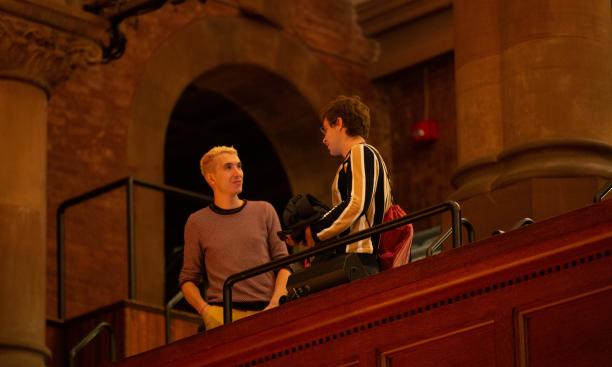
Editor’s Note: Last year Princeton University Concerts began hosting its Do-Re-Meet speed dating and speed friending events. The events provide a series of eight-minute dates in McClean House as an opportunity for music lovers to meet and form new connections, before concluding with group attendance of a concert at the University. An engineering major from the class of 2015 reflects on his March experience at both the dating and friending events for classical music lovers ages 24-39. The author requested anonymity for himself and to use altered names for any dates mentioned due to the nature of the events.
Three minutes into the first speed-date, I realized that I hadn’t allowed a beat of silence to enter the conversation. Whatever campus-magnolia-soothed sociologist’s detachment had characterized my initial observations had apparently evaporated as soon as I’d sat down and locked eyes with Michelle. I found myself reflexively resorting to conversational faux pas I’d thought I’d left behind a decade ago: the lack of silence; abundant follow-up questions about inconsequential topics (Which town by the shore? What turnpike exit is that again?); the dreaded instant termination of each statement with How about you? Worst of all, my returning interactive self-awareness was powerless to change our animated course — found myself inertially along for the conversational ride.
I received the bell indicating it was time to move to the next spot as a blessing. There were a few no-shows, so I had a break to collect my thoughts. As earnest conversations bubbled all around, I reviewed a play-by-play of the conversation, intermittently scribbling down thoughts in a pocket notebook. It registered that Michelle had said she doesn’t actually like classical music, but that she was just interested in trying speed-dating. I have to imagine my sampling was not fully representative, but this would become a curious theme in most of my speed-dates.
In contrast, a few hours later at the speed-friending event, I found myself chatting with Sophie. She had just split with her longtime partner and moved to a sleepy New Jersey suburb for work, where there were few other 20-somethings. I lived amongst abundant 20-somethings in New York, but my closest friends were soon leaving the city for good, and I remembered too well the exacerbated pungency of loneliness in the city of millions. Both of us were looking for new connections.
As the conversation flowed, I soon learned that Sophie was a classical pianist. In fact, just about all of my speed-friending partners turned out to be instrumentalists: pianists, guitarists, flutists and a mandolinist. Perhaps this is why connections here felt so unexacting: I too was an instrumentalist. Despite an initial (three years of) reluctance, I had taken piano lessons all throughout my childhood. Ballades, nocturnes, sonatas, and scherzos formed the soundtrack of my formative years, as my patient, mirthful piano teacher introduced me to her friends Frédéric, Johann, Claude and Yiruma. More recently, after a decade of much sound but little music, someone’s hurried New York move-out left a weathered spinet piano by my building’s discard pile, letting me bring musicmaking home again.
Unfortunately, in my time as a biomedical sciences graduate student, I hadn’t found many people that understood this wordless alchemy. Connections with these other instrumentalists, however, could be tied by that shared musical thread, liberally stitched throughout the ages. Amidst even our more unremarkable conversing in that ancient house, revealing glances repeatedly communicated that we’d both tasted musicmaking’s nonverbal transcendence, and had known it to be indescribably good.
When the speed-friending conversations were over, we made our way to Richardson Auditorium for a performance by The Chiaroscuro Quartet. Once inside, we were ushered upstairs to the right balcony, where newly-established “Do-Re-Mets” filled a whole section overlooking the stage. Phones in hand, people were already exchanging contact information directly, electing to subvert the centralized matchmaking pathways to begin new friendships without delay.
As the musicians took the stage, I slipped into reflecting again on this upcoming season of abundant professional pressures and a resettling social landscape. I languidly scanned the nearby rows, trying to imagine if I would end up growing close to and doing life with any of the people I’d just met. After all, new encounters were always ripe with a kind of transformative possibility, a life-altering potential.
The lights lowered. I settled back into my snugly-felted seat, sighing.
Starting from scratch would take time, though. Getting to know someone well was harder post-undergrad. Busy schedules and larger distances obscured connective compatibility, while the passing years made ever longer the backstory a trusted confidant would hopefully learn.
The music swelled, beckoning. A whirlwind of flying hair and churning bows, the quartet had brought more than enough expressiveness on their transatlantic travels to draw me into the invigorating self-forgetfulness of enthrallment. I drank deeply of their joyous communion.
As the final chord faded into silence, we audience members groggily emerged from our immersion. After we showered the group with a rapturous applause, I turned to Sophie. We both tried to translate our experience into words. Neither one of us succeeded, and this shared futility soon burst open into a warming laughter, bounding mischievously over the slowly emptying auditorium.
Maybe we wouldn’t be starting from scratch.
